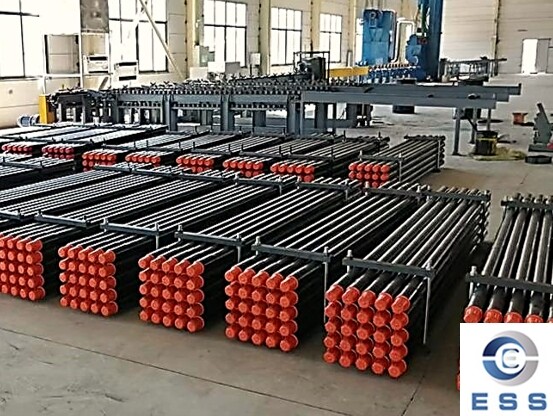
In water well drilling projects, choosing
the right water well drill pipe is crucial. It not only affects drilling efficiency, but is also directly
related to drilling safety and cost. The following is a comprehensive
purchasing guide to help you choose the most suitable water well drill pipe.
Identify needs and application scenarios
1. Drilling depth
The depth of the water well determines the
length and strength requirements of the drill pipe. Deeper water wells require
higher strength drill pipes to withstand greater pressure.
2. Geological conditions
Different geological conditions have
different requirements for the wear resistance and corrosion resistance of
drill pipes. For example, in formations with high sand content, drill pipes
require better wear resistance.
3. Drilling fluid type
The chemical composition of the drilling
fluid will affect the corrosion of the drill pipe. For example, drilling fluids
containing chloride ions are corrosive to certain steels.
Choose the right material
1. Carbon steel drill pipe
Carbon steel drill pipes are relatively low
in price and high in strength, but have weak corrosion resistance, and are
suitable for water well drilling under general geological conditions.
2. Alloy steel drill pipe
Alloy steel drill pipe has higher strength,
better wear resistance and corrosion resistance, and is suitable for complex
geological conditions and deeper water wells.
3. Titanium alloy drill pipe
Titanium alloy drill pipe has excellent
corrosion resistance and high strength, and is suitable for highly corrosive
environments and deep well drilling.
Pay attention to technical parameters
1. Outer diameter and wall thickness
The outer diameter and wall thickness of
the drill pipe directly affect its strength and wear resistance. Generally
speaking, the larger the outer diameter and the thicker the wall thickness, the
higher the strength of the drill pipe.
2. Connection method
Threaded connection is the most common
connection method, and the accuracy and strength of the thread need to be
ensured to prevent loosening during drilling.
3. Fatigue resistance
Drill pipes are subjected to repeated
dynamic stress during drilling, so fatigue resistance is a key indicator.
Consider cost and cost performance
1. Price factor
Carbon steel drill pipes are cheaper, but
may need to be replaced more frequently; alloy steel and titanium alloy drill
pipes are more expensive, but have a longer service life.
2. Maintenance cost
Drill pipes with strong corrosion
resistance can reduce the cost of repair and replacement caused by corrosion.
Brand and quality certification
1. Choose a well-known brand
Well-known brands usually have stricter
quality control and after-sales service.
2. Quality certification
Ensure that the drill pipe meets relevant
industry standards, such as API standards.
Summary
Choosing the right water well drill pipe
requires comprehensive consideration of drilling depth, geological conditions,
drilling fluid type, material properties, technical parameters, cost and cost
performance, and brand and quality certification. By clarifying the needs,
choosing the right materials, paying attention to technical parameters,
weighing the cost and cost performance, and choosing well-known brands and
products that meet quality standards, you can choose the most suitable drill
pipe for your water well drilling project, thereby improving drilling
efficiency, reducing maintenance costs, and ensuring drilling safety.
Read more: Size of Drill Pipe or Advantages & Disadvantages of Oil Drill Pipe













 Eastern Steel Manufacturing Co.,Ltd not only improve product production and sales services, but also provide additional value-added services. As long as you need, we can complete your specific needs together.
Eastern Steel Manufacturing Co.,Ltd not only improve product production and sales services, but also provide additional value-added services. As long as you need, we can complete your specific needs together.










